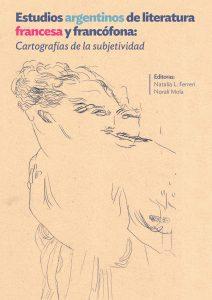Argentine studies of French and Francophone literature: Maps of subjectivity
Keywords:
Francophone literature, Literature, subjectivitySynopsis
Cartographies of Subjectivity comprises a body of research that explores different aspects, functions, and modalities of the presence of the subjective in the works that comprise it. It brings together French-language texts by authors from the 20th and 21st centuries, from a wide variety of backgrounds—Canada, France, Belgium, Argentina, Ivory Coast, Republic of Congo, Rwanda, Morocco, and French Indochina. However, beyond this remarkable heterogeneity, the theme of subjectivity prevails: the emergence of the subjective does not appear here as an egotistical gesture, but rather in its inescapable intersubjective aspect.
Chapters
-
Introduction
-
Part One: Positions of Subjectivity
-
Identity position in translation: the poems of Kanapé- Fontaine
-
Nature, utopia, and society in M. Colmont and J. L. Ortiz
-
The Barefoot Woman, by Scholastique Mukasonga
-
The haunting metaphor of the mirror in Bianciotti's work
-
Writing about dictatorships: the example of two African novels
-
The chronotope of the road in Michel Butor's La modification
-
Crisis of love, words, and conscience in Breton and Duras
-
Part Two: Reminiscences of Subjectivity
-
The social aspect of the bodies narrated in A Woman, by Annie Ernaux
-
The maternal kiss in the gestation of Proustian poetics
-
The limits of humanity: desire in Biography of Hunger
-
The anima and animus in Zone Blanche by Frédérique Germanaud
-
Writing the boundaries in Memoir of a Girl, by Annie Ernaux
-
Power and violence in Operation Massacre and The Punishment
-
Narrating images: the reconstruction of personal and historical memory in Modiano and Duras

Downloads
Published
Categories
License

This work is licensed under a Creative Commons Attribution-NonCommercial-ShareAlike 4.0 International License.


